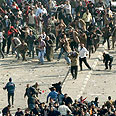
Dictatorship best for peace?
Photo: AP
No one can predict how the drama unfolding in Egypt
over the past week will end. When uncertainty reigns, the natural tendency of those on the other side of the border is to hold on to the known out of understandable fear of the unknown. In Israel this tendency is reinforced by a foreign policy doctrine that privileges stability over the democratic impulses that normally prevail in the making of domestic policy. But the frightening glimpse we have caught of the tremendous forces bubbling up from under the lid held down by the Mubarak regime for so long begs the question: is the perpetuation of Arab dictatorship truly the best guarantee of regional stability and peace?
The Day After
Mira Tzoreff
Op-ed: Suleiman’s rise in Cairo will be good for Israel, create welcomed continuity in Egypt
The centrality of stability in Israeli foreign policy thinking has deep historical roots. After the Free Officers’ Revolution in Egypt in 1952, a revolutionary tidal wave rolled through the Arab world, swallowing Iraq in 1958 and, at its peak, threatening to engulf both the Saudi and Hashemite kingdoms. Faced with the Nasserist threat, Israel pursued a tacit alliance with the conservative monarchies opposed to Egypt in the 1950s and 1960s. The locus of revolutionary export has since shifted - The Iran of Khomeini and Khamenei having taken the place of Nasser’s Egypt - but Israel’s policy has remained essentially unchanged.
To their credit, US policymakers, in the wake of 9/11, engaged in a serious debate about the merits of traditional American foreign policy, which similarly deified dictator-sponsored stability during the Cold War on the grounds that it was necessary to halt the Soviet advance. US calculations changed the minute it was discovered that 15 of the 19 hijackers on September 11 came from America’s most important ally in the Middle East - Saudi Arabia. With such friends, the Americans reasoned, who needs enemies?
At a deeper level, the attacks of 9/11 sparked a serious debate about the appropriate policy vis-à-vis America’s Arab allies, in which widespread anti-American sentiments developed in part as a reaction to US support for repressive government. The neoconservative movement, which hoisted the banner of freedom-promotion abroad, fell from favor after its political patron, George W. Bush, ran into difficulties in Iraq. But the straw man often attributed to the neo-cons - as if democracy could be brought to the Arabs overnight on the tips of bayonets - did an injustice to the basic truth they perceived.
As President Bush put it in a speech in 2003: "Sixty years of Western nations excusing and accommodating the lack of freedom in the Middle East did nothing to make us safe - because in the long run, stability cannot be purchased at the expense of liberty."
Better the devil you know
In Israel, by contrast, there has been no such debate. “We told you so” was the prevalent reaction to Bush’s troubles in Iraq. Then came the victory of Hamas in the elections of 2006, proving, allegedly, that “democracy” and “Arabs” don’t mix. But the triumph of Hamas proved merely the banal fact that democracy amounts to more than elections, and that it is certainly more than a single election.
A less simplistic view would have recognized that between the straw man of the neo-cons - instant democracy à la USA - and the darkness of Saddam Hussein’s regime or the rule of Hamas in Gaza, lies a wide range of possibilities. Yet even when it comes to Syria, the most dangerous of Israel’s Arab foes today, Israel behaves according to the precept “better the devil you know” and, given the opportunity, would not hesitate to sacrifice the independence of Lebanon on the altar of the dubious “stability” proffered by Assad’s repressive regime. This holds true despite the fact that Syrian antagonism towards Israel is motivated largely by the need to generate support for minority rule utterly lacking in legitimacy.
Remarkably, not even the chaos fomented by Arafat in the West Bank and Gaza succeeded in shaking Israeli faith in the goddess of stability. Israel’s most fervent peace-seekers never stopped to ask themselves whether the rationale of Oslo, on the basis of which they anointed a terrorist to rule over their next-door neighbors, required rethinking in light of the tragedy of the second intifada.
Indeed, in Israel, unlike in the US, the stability fetish crosses ideological boundaries, and is today shared by the Left and the Right. Only one brave soul has stood up in Jerusalem for the possibility that freedom is not a Western preserve. But the extraordinary attention lavished on Natan Sharansky in Washington only underscored the extent to which he was ignored at home.
It is easy to dismiss all this with the statement heard often these days - from Western pundits as much as from representatives of the regime in Cairo - that the alternative to Mubarak is unimaginable, but between the nightmare of the Muslim Brotherhood and the bad dream of Mubarak’s regime there is a space worth investigating. And if over the future of the Egyptian regime Israel’s influence is small, over the political evolution of its Palestinian neighbors Israel’s influence is considerable. In any event, it is high time for a serious debate about the role of democracy in Israeli foreign policy.
The author, a historian, is Vice President for Strategy at the Israel Democracy Institute
- Follow Ynetnews on Facebook















